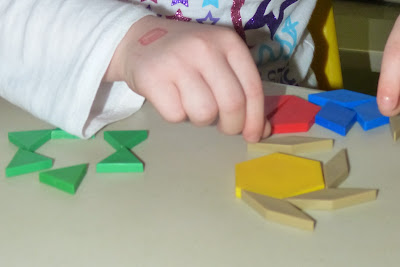This week I added a kennel full of kittens (and puppies) to our play area, as well as several koalas and kangaroos.
We read a lot of books about kangaroos and koalas this week, and sang along with songs about them on youtube.com. You probably already knew that baby kangaroos are called joeys, but did you know baby koalas are too? I grew up in Australia, and didn't know that koalas make a grunting sound - we learned about that here, and heard a kookaburra laughing here.
Kookaburras are a kind of kingfisher, and are mostly brown. Other kingfishers are more colorful, so when we chose our hand print art, we made either colorful kingfishers, or koalas. The children tore and glued paper to make trees for their animals, then the teachers painted and placed their hand prints. The kiddos painted on heads, and added all the details, making some beautiful hand print art.
My hand print alphabet has been inspired by many many blogs and pins, all of which I have posted on this pinterest board. I try to take everything a step further, find ways for the children to do their project, rather than a teacher doing everything for the child. A child's hand print is cute, but if the child is only a passive item to be painted and printed, it isn't art. I try to ensure that our projects are child directed as much as possible, and that my role is to help as needed.
One way we are working on making things more child directed, is to have the kiddos cut out their letter crafts if possible. You can see the lines on our K crafts are kid cut. Some children were able to manage independently, while others sat in my lap and used scissors with finger holes for a child and adult to work together.
Here's another Kk activity: fruit kabobs. We tried papaya for the first time on our kabobs. One child loved it and had lots more, several ate it and said it was okay, and lots just tasted it and decided it wasn't for them. That's okay - we won't know if we like it unless we try it and find out, and children often need to be exposed to a food 10 times before they'll even try it.
Our big art project this week was to do a guided drawing of koi fish, then do a crayon resist and water color wash to complete it. We've fed the koi at the zoo, so the children are familiar with them. We looked at photos and noticed the coloring of koi, then used crayons in those colors for our fish.
The water color wash was made using dried up old markers. You can see how to make it here.
I think these fish are gorgeous! These young artists are 3, 4 or 5 years old. I found the idea here.
There were also a lot of interesting things this week that had nothing to do with the letter Kk, but everything to do with learning. Check out this Tersa Sphinx moth caterpillar Mark found and showed us! It was eating our pentas, before burrowing underground to transform into a moth!
One of our friends broke his arm over the weekend, and he invited everyone to write on his cast.
We enjoyed mini pumpkins and pine cones in our fall sensory box...
... and tasted the first clementines of the season from our little orange tree. Yum!
We continued learning math concepts with a variety of manipulatives, sorting, patterning and developing our fine motor skills along the way.
Some of the older kiddos worked on making hexagons with pattern blocks. We have played with pattern blocks countless times, just exploring, making patterns, or matching the shapes to a template to make pictures, so this is a familiar manipulative. This time I guided their play, encouraging them to make hexagons with each of the six available shapes. The first four worked just fine as they have common angles, but the square and the narrow diamonds do not. I wanted the kiddos to figure that out for themselves, so I gave them each shape in turn, without letting on that it was, I thought, an impossible task.
Surprise! I was wrong. I have over 20 years experience teaching young kiddos, using math manipulatives including pattern blocks, and "knew" that the orange squares don't make a hexagon shape. Why did I never think to make it in negative space, the hole left when squares form the outside of the hexagon instead of the inside?
Next, this same child took 6 narrow brown diamonds, and joined them together to create a hexagon. We counted sides, and found it had 12! That's a dodecahedron. Together we reevaluated, and used three narrow brown diamonds. Yes! It's not the same hexagon, because the angles truly are different, but a six sided shape nonetheless. Another child realized the negative space inside his diamonds made a star!The kiddos made hexagons in negative space using triangles too, and then, returning to the problem, finally achieved a hexagon in negative space with the narrow brown diamonds! When I tell you that I am both teacher and learner in my classroom, this is what I mean. How cool to find there is another way, and to learn something new! I love young children!




















No comments:
Post a Comment